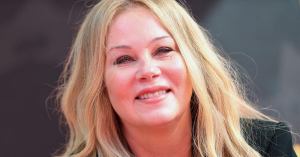A new exposé details the “grueling” behind-the-scenes issues of Fox‘s Sleepy Hollow, including a hostile set and unequal treatment between leads Nicole Beharie and Tom Mison. According to Maureen Ryan’s book Burn It Down, which was released on Tuesday, Beharie and Mison, who played detective Abbie Mills and Ichabod Crane, respectively, “did not want to have a whole lot to do with each other,” according to a source, via The Hollywood Reporter.
Due to Miller and Mison refusing to hug each other in the show, Mison’s character gave her a “courtly” bow. It was reportedly the same for their onscreen narratives, according to showrunner Clifton Campbell, who told Ryan that Mison and Beharie did not want the characters to develop a romantic relationship, despite fans calling for one. For the book, neither Mison nor Beharie commented.
Videos by PopCulture.com
Burn It Down also reveals that following alleged friction between Len Wiseman and Beharie while filming the pilot, actress Lyndie Greenwood, who plays Beharie’s sister Jenny Mills, “was brought on as a potential replacement.” The story comprises one chapter of Ryan’s book, which also includes reporting on other shows, including Lost, The Goldbergs, and Saturday Night Live, describing how a show that was one of Fox’s most popular and promising in 2013 crumbled, as a result of creative mismanagement, tensions, and turnover among Fox executives, producers, creators, and showrunners, creating an unpleasant work environment for one of its stars. The book alleges that this was largely caused by the writers’ room, which had three people of color in season one but was reconstituted for season two with an all-white, male team other than a “sole woman of color.”
According to multiple sources, people in a position of power on the show claimed that from an early stage, they didn’t have an “a good experience with Nicole” but then spread the word to others, including writers who had not worked with her previously. Another source told Ryan she felt alone, while co-star Orlando Jones described it as a “double standard.” “Especially if that person is a woman and a woman of color — those are two groups that already have challenges to begin with,” the same source told Ryan. “It created a very us-against-her environment from day one.” Despite one source claiming she never came across as demanding, Beharie was said to preface statements with “I’m not trying to be difficult.” At least not more than Mison, who a producer allegedly called “the star” and is described as “a handful” by another source. “He had his own set of issues,” they said. “I’ve always said that on any other show, he would’ve been the biggest problem.”
It is believed that Beharie was apprehensive regarding the role, according to sources who worked on the show, some of whom used their first or full names. While she and Mison had trouble adjusting to their parts, Jones told Ryan they were both “out of their depths” and “no one was helping them.” The show’s leadership team floundered creatively from the beginning, one person who worked on the show said, noting early “red flags” over how “problems were handled, and blame was assigned – or reassigned.” When then-showrunner Campbell oversaw the show, Shernold Edwards was hired as a writer. In Edwards’ words, the experience was “hellish” with “a miserable vibe on set.” At one point, when Edwards suggested that Beharie and she talk, Campbell “went off,” telling her she could not speak to Beharie and calling the actress “crazy.” Campbell refuted the claim that he called Beharie “crazy,” he said it was “patently false” and that she was “professional” and “cordial and fun.”
Ryan contends that some of these incidents could be traced to the show’s changing creative leadership. A number of these examples include Campbell becoming “unproductively” emotional and defensive whenever Black writers suggested script elements, HR addressing unconscious bias when assigning scripts, and fans criticizing the show for the treatment of Beharie’s character. While both Mison and Beharie battled steep learning curves, Ryan wrote that Beharie’s growing pains were treated differently.” One source said, “When a bunch of white guys say a person of color is difficult, I tend to assume that there’s a lot more to that story. I found her to be pleasant, extremely talented, and an actor who was adjusting to being a lead. There are growing pains with that. In the time I was there, where the discrepancy came in was how their growing pains were viewed and handled.”








